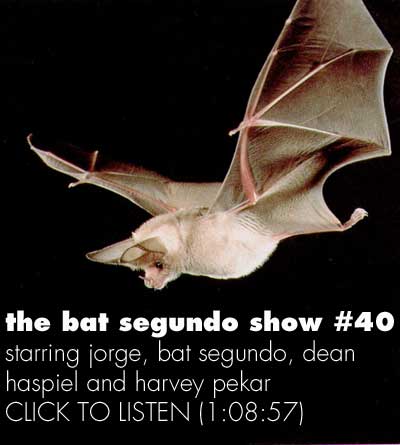The Progressive Bank: “When I see this strip, I think of that poor bunny, and then I feel bad about him, and then I look at Ziggy and feel bad for making fun of him. He’s just some poor guy who’s trying to make a cake! And he’s smiling and keeping a positive outlook on things, no matter how much dirt life kicks in his face! Maybe I’m a softy, but I weep as I type this. Softly. For Ziggy. May Tom Wilson get punched in the eye so hard that he dies, ending your mercilessly long march on the mouse wheel of life.”
Category / Comics
You’ve Got to Know When to Fold-In
Calvin and Hobbes
The Bat Segundo Show #40
Authors: Dean Haspiel and Harvey Pekar
Condition of Mr. Segundo: Feeling old age, pining for an old flame named Virginia.
Subjects Discussed: How Haspiel hooked up with Pekar, the origin of the American Splendor movie, the origin of The Quitter, growing as a storyteller courtesy of “hieroglyphic rants,” paneling, DC Comics scripts vs. Pekar scripts, visual reference and the advantages of the Internet, the inside scoop on Jonathan Ames‘ The Alcoholic, the sudden legitimacy of comics, Pekar meeting Michael Malice, what makes Malice’s tale a “Pekar story,” polar opposites, conflicting ideologies within Pekar’s narratives, how Pekar challenged Malice’s language, boxy layouts, collaborating with illustrators, episodic stories vs. long narratives, the stigma against quotidian narratives, narrative adjustments in the American Splendor movie, the portrayal of pain in Our Cancer Year vs. the American Splendor movie, appearing on David Letterman and being mocked, the reasons behind Pekar’s prolificity, jazz criticism, on the many names Pekar granted himself during the American Splendor run and some of the factors that determine which artists collaborate with Pekar.
Listen: Play in new window | Download
Pop That Cherry, Alan
Alan Moore talks Lost Girls: “I think it struck me that it was kind of unusual that there are all these relatively rarified areas of human experience that very few of us are actually involved in, such as being private detectives, space explorers, or vampire hunters. There are whole shelves full of books that are devoted to all of those exploits in every major city. However, we all have a sexuality, even if we’re celibate – that’s sexuality. And yet, the only medium – the only genre – that deals with sexuality is this grubby, under-the-counter genre in which there are absolutely no standards. It struck me that even though there have been many artists who’ve dabbled in the erotic and the pornographic in the past, most of them have done so anonymously, even if the work they’ve produced has been absolutely wonderful.” (via MadInkBeard)
